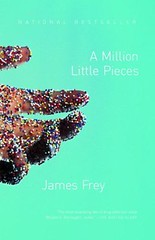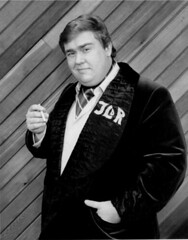Literary hoaxes have a long and distinguished lineage. Writers in desperate need of attention, money, and fame will do pretty much anything. I admit it: us writers can be total whores.
There are the hoaxes that are stories of myth, passing off fabulist tales as the truth, a la Marco Polo or even the Bible. There are books by invented writers, books that exaggerate and conflate, and books that alter history in amusing or disgusting ways.
And then there are out-and-out con jobs. Which brings us to James Frey.
Frey, as you probably know, has been outed as a serial exaggerator (to put it mildly) in his memoir, "A Million Little Pieces." And, as you probably already know, the gut-wrenching tale of addiction and inspiring road to recovery has sold millions of books, following Oprah Winfrey's endorsement.
A novel book
It's not surprising to find out that Frey had first peddled his book as a novel, and was rejected by 17 publishers (do I know the feeling) before being accepted on the stipulation that it would be presented as memoir. Frey agreed and the rest is history.
There seems to be something in the literary air these days about bogus memoirs. Norma Khouri's "Honor Lost -- Love and Death in Modern-Day Jordan" told the case of how the love between a Muslim woman and a Christian man resulted in the woman's father cutting her up into little pieces. Some enterprising reporters in Australia, where Khouri had moved, did some sleuthing, and discovered that the best-selling book was a pack o' lies.
Another writer, Dave Pelzer, writes of a depraved mother in a series of books that detail horrific abuse during his childhood. According to a New York Times magazine article, nobody else in his family ever saw or experienced such abuse. The "facts" in his books can't be confirmed, and there's scant evidence backing up Pelzer's claims. But it's an inspiring tale of redemption, so nobody seems to mind much.
These are all first-person narratives that purport to portray God-honest, no-b.s. truth. It's amusing to a writer of fiction to see how these supposedly true-life books really aren't different than your typical novel, except if they were marketed as such, nobody would read them.
Go into any Creative Writing 101 class, and you'll hear at least one student, after being criticized for writing a scene that's pedestrian or just plain boring, will say, "But that's how it happened." They just take what they've seen in life, and write it up as a story.
In fiction, you get to lie. You're expected to lie. An invented tale can portray larger truths other than the details of a given work.
But with fiction, there is no "authenticity" standard like in non-fiction. This isn't to say that you can't expect exaggeration in your typical first-person non-fiction narrative. Celebrity A's autobiography says that he slept with still-in-the-closet Celebrity B or Movie Director C having a casting couch audition with B-list Starlet D.
But there's a huge difference between someone famous writing their memoirs (and settling scores) and someone writing his in order to be famous. If your claim to fame is what you write -- especially a first-person account of harrowing tales and subsequent recovery -- honesty is your calling card.
I won't go into specifics about Frey's many "inaccuracies" in his book, but when you say you ran over a cop while wasted on a pharmacy list of narcotics, got a plea-bargain for three years in the Big House, and were delivered from incarceration because a mobster friend got things fixed with the D.A. and none of it is true -- not running over the cop, not a three-year sentence, nothing -- you're not simply a teller of tall tales or someone who exaggerates. You're a liar.
What makes it all the worse is that Frey has ridden on his high horse of truth, truth, truth. No more bullshit, he says. This is what really fucking happened. Screw all those Dave Eggers and b.s. artists. Fuck the bullshit, it's time to throw down! (Just like it says on my tattoo.)
Look close, and there's a pattern here. Frey, Khouri, and Pelzer all write first-person tales of woe, their protagonists endure and overcome, and apparently not a single fact-checker vetted their work.
The rise of the confessional memoir is partly to blame for all this gassy bloviation. Not your standard autobiography, the confessional memoir came into vogue during the 1990s as writers mined their own histories for material, often stories of unpleasant childhoods or adult addictions. Some were inspiring, some sordid, some just plain bad. Many were straightforward tales of a blah blah blah-nature, but told with verve. They all supposedly told the truth, and were far more open to confession and contrition than, say, Bill Clinton's memoirs.
The problem is that if you're a nobody peddling a memoir, it better damn well be a page-turner. A good writer can make the dullest of life tales into a worthwhile reading experience, and plenty of memoirs bear this out. But a poor writer usually needs to go over the top to capture readers: drug addition, murder, leaving the toilet seat up.
Most people's lives are, frankly, pretty boring to read about (yours truly included). But as more memoirs hit the streets, the more sensational they've become. You have to capture the public's attention somehow.
Frey fell into that trap. He wanted attention so badly that he took a novel with a plot so preposterous that it wouldn't make it as a soap opera script and called it fact. And if you have to make stuff up in your memoir, either your tale isn't that interesting or you're not that talented. I can't think of anything more damning than that.
Only time will judge the ultimate quality of "A Million Little Pieces," but as a book fraud analyzing a total fraud, I have a feeling that history will serve up a sentence much harsher than Frey's imagined three years in the can.
Friday, January 13, 2006
James Frey: Fake It 'Till You Make It (as a Writer)
Subscribe to:
Comment Feed (RSS)


|